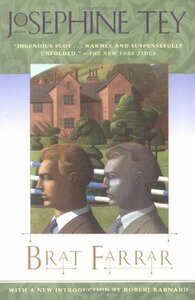Take a photo of a barcode or cover
Very, very polite English family with a mystery in its past. A stranger comes a calling to sort it all out. A pleasant book; not much of a mystery - more like reading a script from Masterpiece Theater. Did I mention how well-mannered everyone is? Even the sociopathic killer takes tea. This book was written in the 1940s, although not much about the war or the suffering and deprivation of the English after the war is mentioned.
mysterious
medium-paced
Plot or Character Driven:
Plot
Strong character development:
No
Loveable characters:
Yes
Diverse cast of characters:
No
Flaws of characters a main focus:
No
A beautifully crafted mystery with, alas, the usual sprinkles of racism, classism, etc. that is common from English writing if this time.
It's a classic. Searched for it for years, and finally found a battered copy at a car boot sale.
I've twice read Tey's The Daughter of Time and count it among my favorite mystery novels, so not entirely sure what kept me from getting to a second novel by her. This novel features a rogue recruited to impersonate a young man approaching the age of his inheritance who went missing eight years prior and is presumed dead. With the exception of the younger twin brother who stands to lose his inheritance, the imposter charms all in the family and the reader as well much like Patricia Highsmith's series character Ripley. I shall not wait twenty years to tackle another Tey novel!
Long on my to-read list, I finally got around to Brat Farrar. And it was excellent: well written, well plotted, psychologically interesting. It feels like it could be an even better movie than book, although it does not seem like one has been made.
The setup is an English family, the children are orphans being raised by their aunt, the oldest son is about to turn 21 and get his inheritance, when someone claiming to be his (slightly) older twin who was presumed drowned in a suicide eight years earlier appears. There is no mystery about the claimant: the reader knows it is false and instead Brat Farrar is pretending to be the twin in part to collect the fortune, but also to be around all of their horses. The interest lies in what happens with this and the question of whether he will be discovered, how, and what impacts all of it will have on what seems to be a closely knit family.
The setup is an English family, the children are orphans being raised by their aunt, the oldest son is about to turn 21 and get his inheritance, when someone claiming to be his (slightly) older twin who was presumed drowned in a suicide eight years earlier appears. There is no mystery about the claimant: the reader knows it is false and instead Brat Farrar is pretending to be the twin in part to collect the fortune, but also to be around all of their horses. The interest lies in what happens with this and the question of whether he will be discovered, how, and what impacts all of it will have on what seems to be a closely knit family.
mysterious
medium-paced
Plot or Character Driven:
Plot
Strong character development:
No
Loveable characters:
Yes
Diverse cast of characters:
No
Possibly I'll review this.
If not, this book is so very British.
If not, this book is so very British.
4.5 stars, really. I love Agatha Christie and a drily observed, slyly witty mystery, and this felt very much in the same vein. You're asked to believe rather a lot, premise-wise, but it's all very well done. A lot of the interest to me was how you come to really like and root for Brat, even as he's doing a rather abominable thing. I think this one was less difficult to suss out than Christie's mysteries (at least for me) but I found the characters more fully sketched and sympathetic.
Reread of the classic novel of imposture and suspense. Still a great read even though I knew how it would turn out. It's always fun to be rooting for a criminal (who turns out to be the moral center of the piece).
This year I started reading a mystery series by Nicola Upson that features Josephine Tey as the female lead as she and her friend Archie solve mysteries. The one I finished just before I started Brat Farrar, the second in the Upson series Angel with Two Faces was so very similar to Brat Farrar. They are both about twins, both about mysterious, possibly suicidal deaths, both set in a similar setting (the south of England) and both were very much horsey kinds of tales
I really enjoyed Brat Farrar. Although I'd figured out the mystery very early on, I was still compelled to read onward because I wanted poor Brat to come out of the story with some sort of hopeful ending, and it just didn't seem as if he could manage it.
Both stories were, also, very psychological rather than procedurally complex. I much prefer my mysteries focusing on the people's motivations and thoughts than the murders so I was quite happy about it.
I really enjoyed Brat Farrar. Although I'd figured out the mystery very early on, I was still compelled to read onward because I wanted poor Brat to come out of the story with some sort of hopeful ending, and it just didn't seem as if he could manage it.
Both stories were, also, very psychological rather than procedurally complex. I much prefer my mysteries focusing on the people's motivations and thoughts than the murders so I was quite happy about it.







